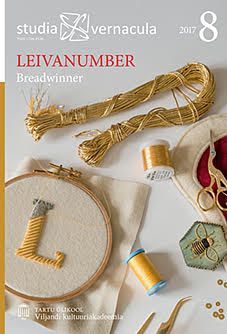Käsitsi tehtud heaolu / Handmade Wellbeing
DOI:
https://doi.org/10.12697/sv.2017.8.208-215Abstract
The staff members and students of the Estonian Native Crafts Department at the University of Tartu Viljandi Culture Academy participated in an international project that aimed at expanding the competences of arts and crafts professionals with the aim of seeking more effective co-operation with the welfare system for elderly people. This Erasmus Plus project ‘Handmade Wellbeing – Collaborative Learning in Craft and Welfare Interfaces’ was funded by the European Union and ran from September 2015 to August 2017.
Welfare institutions for the elderly will soon be faced by an ever-increasing and more informed generation of customers who will place a greater value on creative and active leisure activities, and who will not be content with domestic and medical care alone. This sphere is a promising new field of work for craftsmen and artists, but also one which requires special training.
The project was carried out by the University of Helsinki in Finland (the leading partner), the Estonian Native Crafts Department at the University of Tartu Viljandi Culture Academy, UniT Kunstlabor (an art group from Austria), and the UK-based non-profit organisation, Superact. All the participants trained arts and crafts professionals in order to prepare them for working with elderly people at welfare institutions. The co operation partners were also invited to participate in week-long training sessions organised by each country. These visits helped in coming to understand different local approaches morefully. The discussions that took place during the international training weeks also determined the conceptualisation and structure of the handbook. In fact, the aim of the project was to exchange valuable experiences in order to learn from them. The end result is a manual and study aid that belongs to the field of education science and is useful for both the craftsmen who work with elderly people and also for welfare institutions. Each country also hosted a seminar and an exhibition which were open to the general public.
During the practical phase of the project, each country organised creative and hands-on workshops for the elderly. The objectives and topics of these workshops covered a broad spectrum: among the most popular ones were various handicraft and DIY workshops, but contemporary art and performing arts projects also took place. Each co-operation partner enhanced the project with their unique approach and shared their best practices, something which resulted in efficient and intriguing teaching methods. In Estonia, the workshops took place between September and December 2016 at two different types of elderly care facilities: the day centres in Viljandi and Tartu, and the nursing homes in Viiratsi and Nõo. The workshops were organised by the lecturers Kersti Rattus and Eilve Manglus and the students Indrek Ikkonen and Elen Tammet. The activities varied in their degree of difficulty: the elderly participants tried textile printing, metalwork, ribbon-plaiting, and badge-making.
Handmade Wellbeing brought together an enthusiastic international team. The greatest advantage of this educational model was its comparative perspective and hands-on approach. The generalisations stemming from the experience of international co-operation resulted in a handbook that is accessible to a large audience. Reflection on methods led to the drawing up of concise instructions other arts and crafts professionals can use to prepare themselves physically and mentally when doing similar work. On the one hand, the handbook gives a step-by-step guide to preparing and conducting a workshop, and on the other it adresses ways of relating to elderly people, including how to identify one’s prejudices and even stereotypes. For further information on the project and handbook, please visit the website at: http://craftwellbeing.eu.

